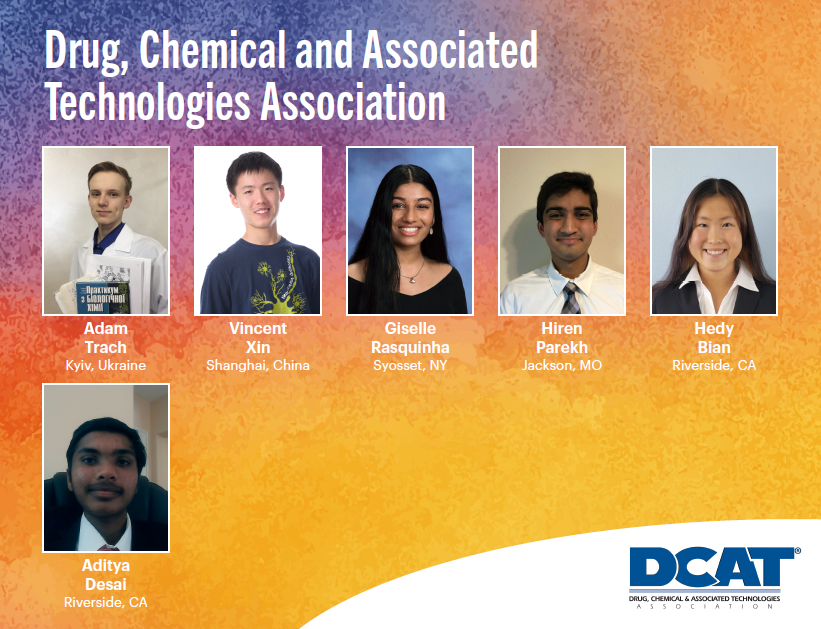DCAT Awards Scholarships at Virtual Regeneron ISEF 2021
Robbinsville, New Jersey May 24, 2021 — The Drug, Chemical & Associated Technologies Association (DCAT) awarded five scholarships to student finalists who participated in the Virtual Regeneron International Science & Engineering Fair (ISEF) held online May 16-21, 2021.
Regeneron ISEF is the world’s largest international pre-college science competition. Virtual Regeneron ISEF 2021 brought together approximately 1,800 high school students from more than 75 countries, regions and territories to showcase their independent research and compete for an average of $5 million in total prizes. DCAT participated as one of 50 Special Award Organizations representing government, industry and education across a wide variety of scientific disciplines that provide awards from their organizations.
“In these challenging times, ISEF managed to provide a virtual forum where talented young scientists were able to showcase their accomplishments,” said Jose M. Hanquier, Senior Research Advisor, TS/MS, External Manufacturing at Eli Lilly and Company, who led the task force that reviewed the projects. “The quality of the works that I reviewed was outstanding and ISEF created an engaging platform that gave judges the ability to clearly understand the hypotheses, methodology and results associated with each project.”

Winning Projects
The scholarship winners were picked after careful review of the students’ online abstracts and video presentations. The five projects chosen by the committee included studies in the areas of chemistry, biochemistry and microbiology.
Adam Trach, a junior at Specialized School No. 89 in Kyiv, Ukraine, won for his project, In Silico Research of the Potential Role of a Number of Compound Class n-acylethanolamines as Inhibitors of E-protein of Coronavirus SARS-COV-2. He utilized molecular docking modeling for in silico modeling to determine whether n-acylethanolamines could bind to the active sites of the SARS-CoV-2 protein. His results showed that all n-acylethanolamines can bind with the active site of the E-protein of coronavirus SARS-CoV-2, but N-stearoylethanolamine possesses the highest affinity to the active site and inhibition constant. The results support the hypothesis of using n-stearoylethanolamine as a potential coronavirus SARS-CoV-2 active molecule.
Hedy Bian and Aditya Desai, both juniors at Martin Luther King High School in Riverside, California, won for their project, Analyzing the Efficacies of Potential Inhibitors Analyzing the Efficacies of Potential Inhibitors of Drug Targets Human Receptor ACE2 and Viral Replication Enzyme RdRp Against SARS-CoV-2. They used molecular docking modeling to analyze ten ACE2 inhibitors and 10 RdRp inhibitors to determine their ability to impede the reception and replication of SARS-CoV-2. They found that many of the ligands demonstrated potential to inhibit either ACE2 or RdRp based up their strong binding affinities.
Hiren Parekh, a junior at Saxony Lutheran High School in Jackson, Missouri, won for his project, Towards the Total Synthesis of the TRAIL-Resistance-Overcoming Cytotoxic Pannokin D for the Development of New Anticancer Pharmaceuticals and a Novel Regioselective Diprenylated Chromone-Derived Flavonoid Synthesis. He proposed a total synthesis of the natural product Pannokin D and successfully completed the first two steps of a proposed seven-step linear synthesis of Pannokin D, a novel prenylated flavonoid with the rare biochemical capability of overcoming tumor necrosis factor-related apoptosis.
Vincent Xin, a junior at Shanghai American School, Puxi Campus in Shanghai, China, won for his project, Potential Probiotic Therapy of Inhibitory Commensal S. epidermidis on Decolonization/Treatment of MRSA and C. acnes and Their Infections. He investigated whether commensal S. epidermidis bacteria colonizing the human nasal cavity are capable of inhibiting S. aureus and C. acnes biofilm formation, the mechanism of inhibition and how it could be applied to prevent colonization by MRSA and other pathogenic bacteria and decrease the incidence of related infections. His findings support the probiotic application of inhibitory S. epidermidis for MRSA decolonization and acne treatment.
Giselle Rasquinha, a senior at Syosset High School in Syosset, New York, won for her project, A Bi-Functional HIV-1 Inactivator Acts before Host Cell Entry. In this study, a new type of HIV-1 inactivator was tested to assess if multiple steps of entry could be targeted to prevent HIV-1 attachment to the host cell and/or membrane fusion between the virus and the host cell. Because of the double-hit synergistic and sequential mechanism, the bivalent HIV-1 inactivator FD028 was able to inactivate HIV-1 at micromolar concentrations with both cell-free HIV-1 and at the cell surface.
About DCAT
The Drug, Chemical & Associated Technologies Association (DCAT) is a not-for-profit, global business development association whose unique membership model integrates both innovator and generic drug manufacturers and suppliers of ingredients, development and manufacturing services, and related technologies. We are committed to provide programs, events and services that help our members meet their business objectives, expand their network of customers and suppliers, and gain insight into industry trends, markets, and those issues impacting pharmaceutical development and manufacturing. With over 400 corporate members, DCAT is headquartered in Robbinsville, New Jersey.

